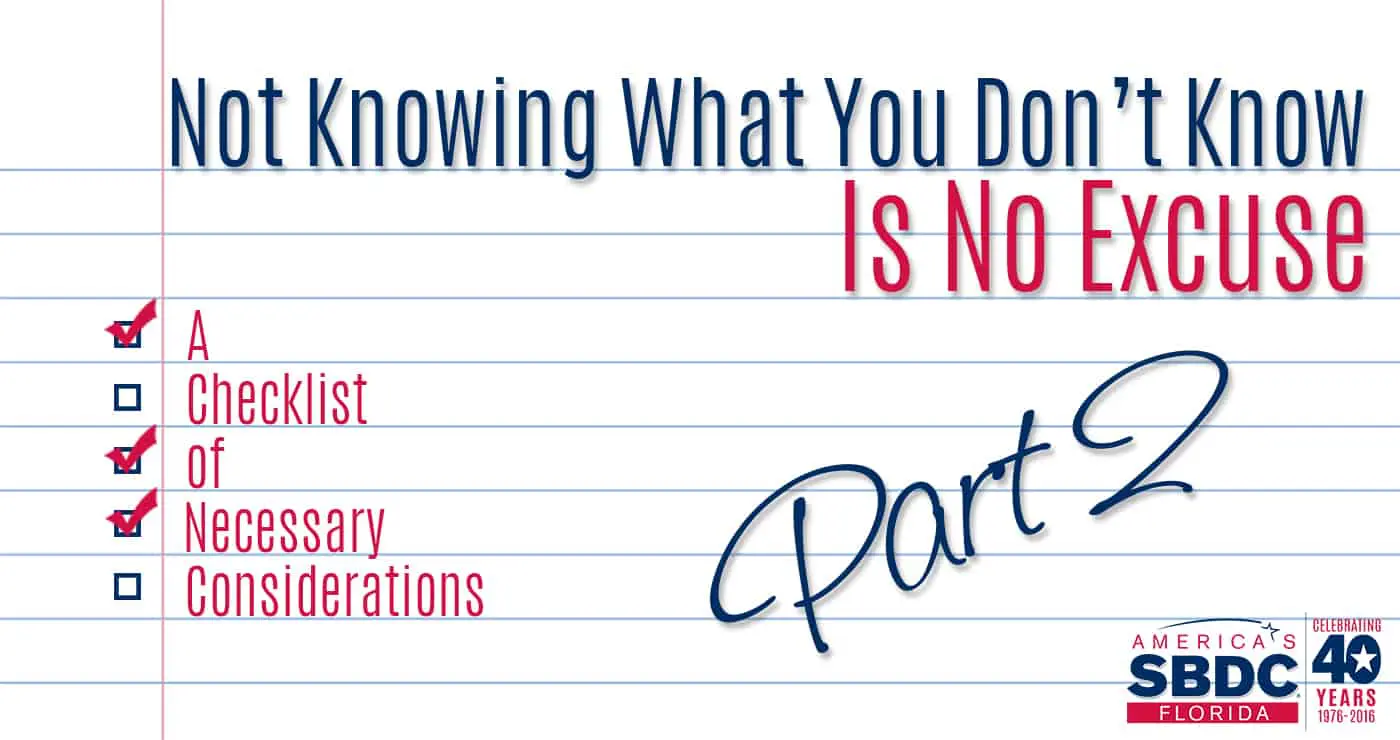Part 2: Not Knowing What You Don’t Know Is No Excuse
These Administrative Foundations Could Be Extra Insurance for Long-term Business Success
Many would-be business owners are so excited to be “starting a business” that they hastily “get married to” the idea of how much fun and freedom they will have. In addition, many hop into what they think will be a “fun time” to grow a company with a relative, friend or business colleague that they may have worked with in the past, or perhaps, to the contrary, someone who seems exciting and could be their “professional complement.”
The following represents the second of a three-part checklist of necessary considerations – taken from a small business case study – meant to serve as health prevention for a business. In this case, one of the entrepreneurs had little business knowledge of shareholder relationships and disastrous consequences of 50/50 ownership. Disregarding any of these could be very costly.
(Disclaimer: This is not meant to be an exhaustive list. Please consult a lawyer and CPA or for specific assistance.)
Lesson #4
Shore up your weaknesses. What type of businessperson are you and what are your talents? Do you know yourself well enough to focus on partnering/hiring staff and other associates that will complement your skills? It’s always a good idea to collaborate with other professionals who complement the current skills in an organization rather than have the same skillsets. If you are a great people person and love sales, maybe the best alignment is with someone who is strong at running the office operations. If sales is not a strength, then it’s a must that you hire someone with a strong “hunter” skillset and, even better, someone with some solid community relationships. If an owner or executive needs assistance in identifying good candidates, a leadership or business coach or a human resources consultant may help to provide insight on all employees or candidates.
Lesson #5
Follow the money. Select a good CPA and keep an eye on company financials, bank accounts and other liquid assets that are accessible by others. Monitor credit card statements and other financial documents on a monthly basis. In many cases, one or more of the shareholders/members who are involved in the company’s operations are not savvy about financial matters and leave it to the others whom they believe to have more of an understanding of balance sheets, cash flow, etc. Many businessowners fail to recognize the vulnerability they place themselves in by allowing this to happen. They believe that, by hiring someone to keep their books, it absolves them of any necessity to understand, review or keep track of anything financially related. If the business owner isn’t savvy about his/her financial house, a serious day of reckoning could occur. It can come in the form of employee theft, a cash deficit to pay bills, bounced checks or, worst case, bankruptcy for the business as well as for the owner(s). If an officer is designated as the treasurer, it does not release the other members of their responsibility/duty to review the company’s financials.
A good CPA, bookkeeper, CFO, etc., should not only provide a paper report of prior proceedings, but assist the owner in future projections and opportunities for growth. It’s best to pick someone who is familiar with the business’ industry to ensure proper tax accounting, deductions, asset management, etc.
Lesson #6
Legal protection. Hire, or at a minimum, identify a good business attorney before you need one. Odds are, every business owner will need one sometime during the life of the business. Interview several. Again, it’s a bonus to have one that is familiar with the type of business that you’re running. Once you’ve identified him/her, have a discussion about your business, what you intend to do, types of clients, etc. It’s better to hire an attorney before you have a legal problem. Also, remember that one attorney cannot represent the company and its owners. In fact, the company’s attorney will not be able to represent multiple owners if there is a disagreement. Each owner should identify their own legal representative to review initial company documents and for any future issues.






Karen E. Krymski
Consultants, Government Contracting Consultants, Krymski, TampaFlorida PTAC at USF, Tampa
Specialty: Procurement, Marketing
Karen Krymski has more than 20 years of experience as an entrepreneur, owning a firm that specialized in marketing, business development, public affairs, organizational leadership and strategic planning. Clients ranged from start-up small businesses to Fortune 500 companies (gold emblem brands). Her company was retained to assist in achieving clients’ strategic direction, branding and revenue goals and most retained her firm for successful execution following the planning process. Krymski’s industry knowledge spans a broad range and includes medical (behavioral health, physician practices and home healthcare) and dental; utilities (water, wastewater, solid waste and recycling); and retail promotions. She built a successful federal government business pipeline for a women-owned IT security company and also founded a local chapter of a national women’s business organization, achieving 350 invested members within a four year period. She earned a bachelor’s in health education and a master’s in public health planning from the University of Pittsburgh and completed a hospital administrative residency in Fort Myers. In 2007, she was honored as the Managing Director of the Year by eWomenNetwork, was a finalist in 2008 for the Tampa Bay Business Journal’s Businesswoman of the Year and was awarded the Iconic Woman award in 2012 from the St. Petersburg Chamber of Commerce.